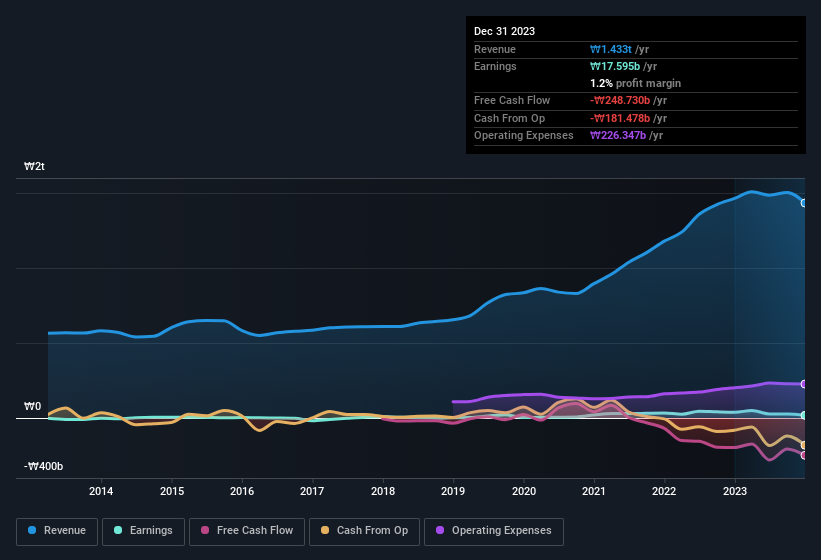- South Korea
- /
- Machinery
- /
- KOSE:A000490
Daedong (KRX:000490) Posted Weak Earnings But There Is More To Worry About

Daedong Corporation's (KRX:000490) stock wasn't much affected by its recent lackluster earnings numbers. Our analysis suggests that they may be missing some concerning details underlying the profit numbers.
View our latest analysis for Daedong

A Closer Look At Daedong's Earnings
Many investors haven't heard of the accrual ratio from cashflow, but it is actually a useful measure of how well a company's profit is backed up by free cash flow (FCF) during a given period. In plain english, this ratio subtracts FCF from net profit, and divides that number by the company's average operating assets over that period. You could think of the accrual ratio from cashflow as the 'non-FCF profit ratio'.
As a result, a negative accrual ratio is a positive for the company, and a positive accrual ratio is a negative. While it's not a problem to have a positive accrual ratio, indicating a certain level of non-cash profits, a high accrual ratio is arguably a bad thing, because it indicates paper profits are not matched by cash flow. That's because some academic studies have suggested that high accruals ratios tend to lead to lower profit or less profit growth.
For the year to December 2023, Daedong had an accrual ratio of 0.23. Therefore, we know that it's free cashflow was significantly lower than its statutory profit, which is hardly a good thing. Over the last year it actually had negative free cash flow of ₩249b, in contrast to the aforementioned profit of ₩17.6b. Coming off the back of negative free cash flow last year, we imagine some shareholders might wonder if its cash burn of ₩249b, this year, indicates high risk. However, that's not the end of the story. We can look at how unusual items in the profit and loss statement impacted its accrual ratio, as well as explore how dilution is impacting shareholders negatively.
That might leave you wondering what analysts are forecasting in terms of future profitability. Luckily, you can click here to see an interactive graph depicting future profitability, based on their estimates.
One essential aspect of assessing earnings quality is to look at how much a company is diluting shareholders. As it happens, Daedong issued 9.0% more new shares over the last year. As a result, its net income is now split between a greater number of shares. To talk about net income, without noticing earnings per share, is to be distracted by the big numbers while ignoring the smaller numbers that talk to per share value. Check out Daedong's historical EPS growth by clicking on this link.
A Look At The Impact Of Daedong's Dilution On Its Earnings Per Share (EPS)
Daedong's net profit dropped by 14% per year over the last three years. And even focusing only on the last twelve months, we see profit is down 54%. Sadly, earnings per share fell further, down a full 56% in that time. Therefore, the dilution is having a noteworthy influence on shareholder returns.
In the long term, if Daedong's earnings per share can increase, then the share price should too. But on the other hand, we'd be far less excited to learn profit (but not EPS) was improving. For that reason, you could say that EPS is more important that net income in the long run, assuming the goal is to assess whether a company's share price might grow.
The Impact Of Unusual Items On Profit
The fact that the company had unusual items boosting profit by ₩19b, in the last year, probably goes some way to explain why its accrual ratio was so weak. While it's always nice to have higher profit, a large contribution from unusual items sometimes dampens our enthusiasm. We ran the numbers on most publicly listed companies worldwide, and it's very common for unusual items to be once-off in nature. And, after all, that's exactly what the accounting terminology implies. We can see that Daedong's positive unusual items were quite significant relative to its profit in the year to December 2023. As a result, we can surmise that the unusual items are making its statutory profit significantly stronger than it would otherwise be.
Our Take On Daedong's Profit Performance
Daedong didn't back up its earnings with free cashflow, but this isn't too surprising given profits were inflated by unusual items. The dilution means the results are weaker when viewed from a per-share perspective. For the reasons mentioned above, we think that a perfunctory glance at Daedong's statutory profits might make it look better than it really is on an underlying level. If you want to do dive deeper into Daedong, you'd also look into what risks it is currently facing. Be aware that Daedong is showing 4 warning signs in our investment analysis and 2 of those are a bit concerning...
Our examination of Daedong has focussed on certain factors that can make its earnings look better than they are. And, on that basis, we are somewhat skeptical. But there is always more to discover if you are capable of focussing your mind on minutiae. Some people consider a high return on equity to be a good sign of a quality business. So you may wish to see this free collection of companies boasting high return on equity, or this list of stocks that insiders are buying.
New: Manage All Your Stock Portfolios in One Place
We've created the ultimate portfolio companion for stock investors, and it's free.
• Connect an unlimited number of Portfolios and see your total in one currency
• Be alerted to new Warning Signs or Risks via email or mobile
• Track the Fair Value of your stocks
Have feedback on this article? Concerned about the content? Get in touch with us directly. Alternatively, email editorial-team (at) simplywallst.com.
This article by Simply Wall St is general in nature. We provide commentary based on historical data and analyst forecasts only using an unbiased methodology and our articles are not intended to be financial advice. It does not constitute a recommendation to buy or sell any stock, and does not take account of your objectives, or your financial situation. We aim to bring you long-term focused analysis driven by fundamental data. Note that our analysis may not factor in the latest price-sensitive company announcements or qualitative material. Simply Wall St has no position in any stocks mentioned.
About KOSE:A000490
Low and slightly overvalued.


